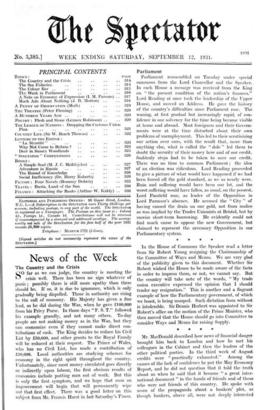Parliament Parliament reassembled on Tuesday under special summons from the
Lord Chancellor and the Speaker. In each House a message was received from the King on " the present condition of the nation's finances." Lord Reading at once took the leadership of the Upper House, and moved an Address. He gave the history of the country's difficulties since Parliament rose. The waning, at first gradual but increasingly rapid, of con- fidence in our solvency for the time being became visible at home and abroad. Most foreigners and their Govern- ments were at the time disturbed about their own problems of unemployment. This led to their scrutinizing our action over ours, with the result that, more than anything else, what is called the " dole " led them to doubt the security of their money here and of our credit. Suddenly steps had to be taken to save our credit. There was no time to summon Parliament ; the idea of an election was ridiculous. Lord Reading proceeded to give a picture of what would have happened if we had been forced off the gold standard, as we so nearly were. Ruin and suffering would have been our lot, and the worst suffering would have fallen, as usual, on the poorest. Lord Passfield rose, as leader of the Opposition in Lord Parmoor's absence. He accused the " City " of having caused the drain on our gold, not from malice as was implied by the Trades Unionists at Bristol, but by unwise short-term borrowing. He evidently could not find much cause to oppose the new Government, but claimed to represent the necessary Opposition in our Parliamentary system.






























